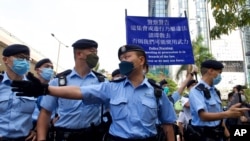Hundreds of demonstrators gathered outside a Hong Kong courthouse Monday in a show of support for 47 pro-democracy activists and political figures who were scheduled to be formally charged with conspiracy to commit subversion.
The demonstrators chanted pro-democracy slogans such as “Liberate Hong Kong, revolution of our times,” and “Release all political prisoners,” while also holding up the now-familiar three-finger salute seen in the Hollywood movie “Hunger Games” that has been embraced as a symbol of defiance against autocratic rule in Myanmar and Thailand.
The charge of conspiracy to commit subversion relates to the defendants’ participation last year in unofficial election primaries for Hong Kong’s legislature. The activists, who were arrested last month but released, now have been denied bail.
Those charged include Joshua Wong, who is already behind bars after being found guilty of charges of inciting and organizing a demonstration in June 2019 in a separate case.
Also charged are former university law professor Benny Tai and former pro-democracy lawmaker Claudia Mo.
Those summoned Sunday were informed only days ago that they must report to police stations for detention. They had been expected to do so in April.
They are among several high-profile activists who have been arrested in recent months, including media tycoon Jimmy Lai. He stands accused of foreign collusion. Others, meanwhile, have fled into political exile.
In an interview with VOA, self-exiled Hong Kong activist Baggio Leung, now in Washington, criticized the detentions of the 47 activists.
“I think this so-called crime is ridiculous, 47 activists are facing maximum life (in) prison, and what they did is only trying to win (a) majority in the legislature,” he said.
“There is no room for (a) pro-democracy legal party,” Leung added.
After pro-democracy protests in 2019, Beijing implemented the national security law for Hong Kong that took effect on June 30, 2020. The measure prohibits secession, subversion, terrorism and collusion with foreign forces, and its details can be widely interpreted. The law has been the catalyst for sweeping changes in the city, as street protests have stopped and slogans have been banned.
Political commentator Joseph Cheng says the move is all part of a plan for the pro-democracy movement to be squashed in the city, which Britain transferred to Chinese rule in 1997. Under a “One Country, Two Systems” agreement signed by Britain and China, Beijing promised that Hong Kong would retain a “high degree of autonomy” until 2047.
Commenting on the current political situation in the semi-autonomous province, Cheng said, “This is an important part of the strategy to deny the pro-democracy movement a role in the political system.”
Cheng said it’s unlikely that the arrested candidates will stand in the re-arranged Legislative Council elections in September and that the whole crackdown may affect pro-democratic parties.
“The electorate may have lost heart. Most people no longer see any legal channels of political participation. They are waiting for chances of major legal protest activities,” Cheng added.
The developments come after recent news Beijing is planning an overhaul of the electoral system in Hong Kong.
“Patriots” should only govern Hong Kong, according to top Beijing official Xia Baolong, director of the Hong Kong and Macao State Affairs Office of the State Council. Hong Kong Chief Executive Carrie Lam has said she supports a call for electoral reforms that would ensure the city’s legislature is filled with pro-Beijing loyalists.
Chinese state-affiliated media outlet Global Times reported that a “detailed plan of rectifying the electoral system in Hong Kong” would likely be raised in China’s annual Two Sessions political meeting in March.
Several District Councilors were among those charged on Sunday, and Lo Kin-Hei, Hong Kong’s Southern District Councilor, told VOA the charges are “political prosecution.”
“We think the primary, that the government used to accuse the arrestees, is totally legal and legitimate. It is a way for pro-democracy supporters to tell politicians whom they prefer.”
Despite questions as to whether a legal pro-democracy opposition party can exist in Hong Kong’s system, Kin-Hei said activists will remain firm.
“We will keep on speaking up despite the difficulties. The oppositions will still exist, we will keep doing things we believe are legal and keep voicing out.
But Hong Kong politician Avery Ng, who is one of 15 activists facing illegal assembly charges stemming from the protests in 2019, told VOA that Hong Kong is in a “new age of fear” and that no one can say or do little without risk of being prosecuted.
“The remaining few of us, opposition leaders, are treading on a thin layer of ice, and we just do not know at which point will touch the red line. Actually, the red line will chase us,” Ng said.
Ng doesn’t believe legal pro-democracy opposition in Hong Kong is completely dead but accepts pro-democracy parties are already without leaders.
“It’s already sort of leaderless. At least 90% of the leaders are already gone, the voices, for the remainder of us, there’s not much you can work with. The leaders are now speechless,” Ng added.
Despite Sunday's news of the detentions, eight people who were involved in the mass arrests in January were not charged, including U.S. human rights lawyer John Clancey.




